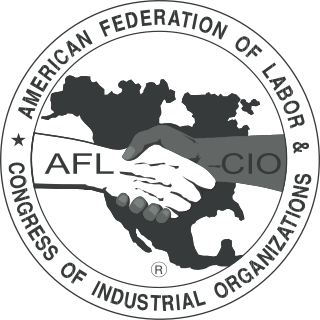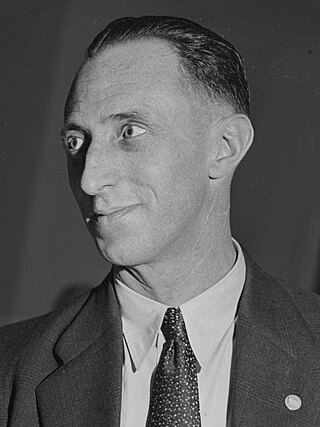Related Research Articles
The Pacific Maritime Association (PMA) is a non-profit organization based in San Francisco, California that represents employers of the shipping industry on the Pacific coast.

The American Federation of Labor and Congress of Industrial Organizations (AFL-CIO) is a national trade union center that is the largest federation of unions in the United States. It is made up of 60 national and international unions, together representing more than 12 million active and retired workers. The AFL-CIO engages in substantial political spending and activism, typically in support of progressive and pro-labor policies.

Harry Bridges was an Australian-born American union leader, first with the International Longshoremen's Association (ILA). In 1937, he led several chapters in forming a new union, the International Longshore and Warehouse Union (ILWU), expanding members to workers in warehouses, and led it for the next 40 years. He was prosecuted for his labor organizing and designated as subversive by the U.S. government during the 1930s, 1940s, and 1950s, with the goal of deportation. This was never achieved.

The 1934 West Coast waterfront strike lasted 83 days, and began on May 9, 1934, when longshoremen in every US West Coast port walked out. Organized by the International Longshoremen's Association (ILA), the strike peaked with the death of two workers on "Bloody Thursday" and the subsequent San Francisco General Strike, which stopped all work in the major port city for four days and led ultimately to the settlement of the West Coast Longshoremen's Strike.

The International Longshoremen's Association (ILA) is a North American labor union representing longshore workers along the East Coast of the United States and Canada, the Gulf Coast, the Great Lakes, Puerto Rico, and inland waterways; on the West Coast, the dominant union is the International Longshore and Warehouse Union. The ILA has approximately 200 local affiliates in port cities in these areas.

Francis J. Murnane (1914–1968) was a longshore worker from Portland, Oregon, United States who was called "the cultural and historical conscience of Portland" after playing a key or solitary role in preserving several historical monuments in the city. He was the president of his union, International Longshore and Warehouse Union (ILWU) Local 8, and died of a heart attack while presiding over a meeting. A memorial wharf dedicated to Murnane, located on the Willamette River at Tom McCall Waterfront Park, is slated for demolition in 2009. An effort to restore the Murnane memorial is underway.
The Waterfront Workers History Project is a program of the University of Washington, which serves to document the history of workers and unions active on the ports, inland waterways, fisheries, canneries, and other waterfront industries of the western United States and Canada, specifically, California, Oregon, Washington, Alaska, and British Columbia. In collaboration with the Pacific Northwest Labor and Civil Rights History Projects, and sponsored by the Harry Bridges Center for Labor Studies, the Project is a collective effort to organize and present historical data covering significant events from 1894 to the current day.

The International Longshore and Warehouse Union (ILWU) is a labor union which primarily represents dock workers on the West Coast of the United States, Hawaii, and in British Columbia, Canada; on the East Coast, the dominant union is the International Longshoremen's Association. The union was established in 1937 after the 1934 West Coast Waterfront Strike, a three-month-long strike that culminated in a four-day general strike in San Francisco, California, and the Bay Area. It disaffiliated from the AFL–CIO on August 30, 2013.

Silme Domingo was a Filipino American labor activist. With Gene Viernes, he was murdered in Seattle on June 1, 1981, while attempting to reform the Local 37 of the International Longshore and Warehouse Union (ILWU).
On July 1, 1971, members of the International Longshore and Warehouse Union (ILWU) walked out against their employers, represented by the Pacific Maritime Association (PMA). The union's goal was to secure employment, wages, and benefits in the face of increased mechanization, shrinking workforce, and the slowing economic climate of the early 1970s. The strike shut down all 56 West coast ports, including those in Canada, and lasted 130 days, the longest strike in the ILWU's history.
Puget Sound fishermen's strike of 1949 was a labor strike by fishermen in the Pacific Northwest.
Shaun "Jack" Maloney (1911–1999) was an American labor activist active in the Midwestern United States in the 20s and 30s and the West Coast of the United States after 1942. Though he was best known for his role in the 1934 Minneapolis Teamster Strike, Maloney was also an important figure in the International Longshore and Warehouse Union in the 1970's.

In the late 1870s, Squamish and Tsleil-Waututh communities on the North Shore of Burrard Inlet experienced an increase of physical and economic encroachment from the expansion of neighbouring Vancouver. Faced with urbanization and industrialization around reserve lands, Squamish and Tsleil-Waututh traditional economies became increasingly marginalized, while government-imposed laws increasingly restricted Native fishing, hunting, and access to land and waters for subsistence. In response, these communities increasingly turned to participating in the wage-labor economy.
George Morris (1903–1997) was an American writer and labor editor for the CPUSA Daily Worker newspaper who left a body of written work and oral history that documents militant trade unionism as part of American labor history during the first half of the 20th century – including the 1934 West Coast waterfront strike.

Ottilie Markholt was an American trade unionist, labor historian, and political activist who spent most of her life in Tacoma, Washington. At different points in her life, Markholt was a member of the Communist Party, CORE, NAACP, IWW, and OPEIU. Markholt authored multiple books and countless articles about labor history on the West Coast and made efforts to expand labor studies and education.
Ronald "Ron" Magden was a historian from Tacoma, Washington who specialized in maritime labor history and Japanese-American history in the Puget Sound region.
Jerry Tyler was a longshore worker, labor activist, and radio personality from Seattle, best known for being the host of a popular radio show Reports From Labor, which ran from 1948 to 1950.
The 1916 West Coast waterfront strike was the first coast-wide strike of longshore workers on the Pacific Coast of the United States. The strike was a major defeat for the International Longshoremen's Association, and its membership declined significantly over the next decade. Employers won control over hiring halls and started a campaign to drive out the union's remaining presence.
Germain Bulcke was a Belgian-American longshore worker from San Francisco and leader in the International Longshore and Warehouse Union.
Earl George was a leader in the Communist Party and International Longshore and Warehouse Union, photographer, and civil rights activist from Seattle.
References
- 1 2 3 4 "Phil Lelli papers - Archives West". archiveswest.orbiscascade.org. Retrieved 2023-08-17.
- ↑ "BRIDGES DEPICTED AS STRIKE-BREAKER; Longshoremen's Official of Pacific Coast Sees 'False Halo' Over C.I.O. Leader RISE LAID TO PROPAGANDA Tiny Thronson, at Meeting Here, Says Maritime Union Man Got Start as 'Ribbon Clerk' (Published 1939)". 1939-07-07. Retrieved 2023-08-17.
- 1 2 3 Schwartz, Harvey (2004-05-02). "Oral History of Phil Lelli". ILWU. Retrieved 2023-08-17.
- 1 2 "Section of SR 509 named for Longshore activist Phil Lelli | The News Tribune". 2016-06-03. Archived from the original on 2016-06-03. Retrieved 2023-08-17.
{{cite web}}: CS1 maint: bot: original URL status unknown (link) - ↑ "Seattle Waterfront Workers Project: Ron Magden". depts.washington.edu. Retrieved 2023-08-18.
- ↑ Groves, David (2016-05-25). "State to name Tacoma highway after ILWU leader Phil Lelli". The Stand. Retrieved 2023-08-17.